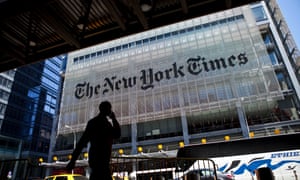These are the worst of times for the American news media, but they are also the best. The newspaper industry as a whole has been dying slowly for years, as the pathetic tale of the once-mighty Chicago Tribune reminds us. But for the handful of well funded journalistic enterprises that survive, the Trump era is turning out to be a “golden age” – a time of high purpose and moral vindication.
The people of the respectable east coast press loathe the president with an amazing unanimity. They are obsessed with documenting his bad taste, with finding faults in his stupid tweets, with nailing him and his associates for this Russian scandal and that one. They outwit the simple-minded billionaire. They find the devastating scoops. The op-ed pages come to resemble Democratic fundraising pitches. The news sections are all Trump all the time. They have gone ballistic so many times the public now yawns when it sees their rockets lifting off.
A recent Alternet article I read was composed of nothing but mean quotes about Trump, some of them literary and high-flown, some of them low-down and cruel, most of them drawn from the mainstream media and all of them hilarious. As I write this, four of the five most-read stories on the Washington Post website are about Trump; indeed (if memory serves), he has dominated this particular metric for at least a year.
And why not? Trump certainly has it coming. He is obviously incompetent, innocent of the most basic knowledge about how government functions. His views are repugnant. His advisers are fools. He appears to be dallying with obviously dangerous forces. And thanks to the wipeout of the Democratic party, there is no really powerful institutional check on the president’s power, which means that the press must step up.
But there’s something wrong with it all.
The news media’s alarms about Trump have been shrieking at high C for more than a year. It was in January of 2016 that the Huffington Post began appending a denunciation of Trump as a “serial liar, rampant xenophobe, racist, birther and bully” to every single story about the man. It was last August that the New York Times published an essay approving of the profession’s collective understanding of Trump as a political mutation – an unacceptable deviation from the two-party norm – that journalists must cleanse from the political mainstream.
It hasn’t worked. They correct and denounce; they cluck and deride and Trump seems to bask in it. He reflects this incredible outpouring of disapprobation right back at the press itself. The old “liberal bias” critique, a minor deity in the pantheon of Republican paranoia since the days of Trump’s hero Richard Nixon, has been elevated to first place. Trump and company now use it to explain everything. And the news media’s reputation sinks lower and lower as they advance into their golden age.
What explains this dazzling disconnect? Yes, Trump is unpopular these days, but not nearly as unpopular as he deserves to be (among other amazing things, he is now reported to be more popular than Hillary Clinton). How can our opinion-leaders believe something so unanimously, so emphatically, and yet have so little success persuading their erstwhile opinion-followers to get in line?
One part of the explanation is the structural situation of the news media. As newspapers die off, their place in the American consciousness is taken by social networks of both the formal and informal variety. Thanks to Facebook and Twitter, these days we read only that which confirms our biases. Once upon a time, perhaps, the Washington Post could single-handedly bring down a president, but those days have passed.
But there’s also a second reason, one that is even more fundamental. The truth is that the unanimous anti-Trumpness of the respectable press is just one facet of a larger homogeneity. As it happens, the surviving press in this country is unanimous about all sorts of things.
There are their views on trade. Or their views on what they call “populism”. Or their views on what they call “bipartisanship”. Or their views on just about anything having to do with the decline of manufacturing (sad but inevitable) and the rise of the “creative” white-collar professions (the smart ones, so meritorious).
This is one of the factors that explains the many monstrous journalism failures of the last few decades: the dot-com bubble, which was actively cheered on by the business press; the Iraq war, which was abetted by journalism’s greatest sages; the almost complete failure to notice the epidemic of professional misconduct that made possible the 2008 financial crisis and the rise of Donald Trump, which (despite the media’s morbid fascination with the man) caught nearly everyone flatfooted.
Everything they do, they do as a herd – even when it’s running headlong over a cliff.
They still cannot suppress their admiration for bankers. Just the other week, for example, the New York Times’s Dealbook section could be found marveling at how one of the senior officers of Goldman Sachs (“possibly the most powerful investment bank in the world”) likes to DJ in his spare time.
They are endless suckers for credentialing, especially of the foreign policy variety. Last Friday, the Washington Post ran a profile of Hillary Clinton’s former foreign policy adviser, whom they caught up with giving a talk at Yale, his alma mater.
The paper told how the adviser “ran through a list of his early mentors”, including eminent personages from Brookings, the State Department and the Council on Foreign Relations, and then turned to the inevitable matter of Clinton’s loss, a subject so bittersweet you could almost see the tears streaming down readers’ faces as they were prompted to recall, yet again, the ingratitude of a nation that had rejected her team of brilliants for the buffoon Trump.
Similar examples could be piled up by the dozens, if not the thousands. The American news media’s respect for tech CEOs and foreign-policy experts are the photographic negative of their overwhelming contempt for Dumb Donald.
These things don’t happen because the journalists that remain are liberals. It happens because so many of them are part of the same class – an exalted and privileged class. They are professionals and they believe in the things that so many other professional groups believe in: consensus, “realism”, credentialing, the wisdom of their fellow professionals and (of course) the stupidity of the laity.
This is the key to understanding many of their biases – and also for understanding why they are so utterly oblivious to how they appear to the rest of America.
What do I mean? Consider Politico’s famous email tip-sheet, Playbook, which is read religiously every morning by countless members of the DC press corps, including myself. About two-thirds of the publication consists of useful summaries of the day’s news stories.
The rest, however, is a sort of People magazine for the Washington journalist community, in which the reader is invited to celebrate leading journalists’ (and politicians’) birthdays, congratulate leading journalists (and politicians) for their witty phrase-making, learn which leading journalist (and politician) was seen at which party and anticipate which leading journalist (and politician) is going to be on which Sunday program.
Nor is Playbook the only entry in this genre. Before there was Politico there was ABC News and The Note, a similar email newsletter that also celebrated what it called the Gang of 500, the happy and hard-partying political and journalistic insiders who supposedly made Washington tick.
These things seem innocent and fun, of course. But there is an unwritten purpose to these daily honor rolls of journo/political friendship and that is to define the limits of what is acceptable.
These things seem innocent and fun, of course. But there is an unwritten purpose to these daily honor rolls of journo/political friendship and that is to define the limits of what is acceptable.
Like the guestlist at Lally Weymouth’s party in the Hamptons, which was described so salaciously in Playbook a little while ago, a tiny handful of people and publications and ideas are in; everyone else is out.
It’s about legitimacy, of course, and what’s left of the respectable press is utterly captivated by the theme. It completely defines their war on Trump, for example. They know what a politician is supposed to look like and act like and sound like; they know that Trump does not conform to those rules; and they react to him as a kind of foreign object jammed rudely into their creamy world, a Rodney Dangerfield defiling the fancy country club.
I believe that the news media needs to win its war with Trump, and urgently so. But as long as they understand that war as a crusade to reestablish the old rules of legitimacy, they are going to continue to fail. Until the day they get it right, the world will burn while the in-crowd parties obliviously on.
https://www.theguardian.com/commentisfree/2017/jul/21/media-war-trump-destined-fail
https://www.theguardian.com/commentisfree/2017/jul/21/media-war-trump-destined-fail






Geen opmerkingen:
Een reactie posten